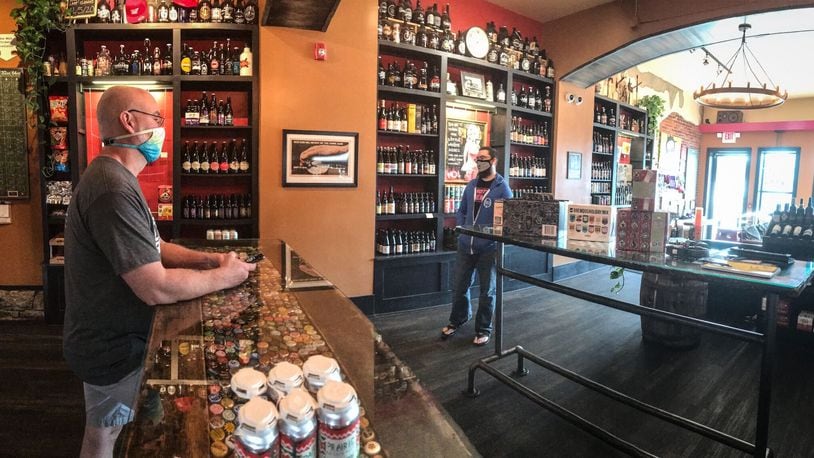DeWine also announced new, enhanced public health orders, including no longer allowing banquet halls to have dancing, games or open congregate areas and requiring retailers to post a mask requirement signs and enforce compliance. The Ohio Bureau of Workers' Compensation will issue written warnings on first violations and store closures of up to 24 hours for second violations.
“This requires everyone to be seated and masked unless they are actively consuming food or drinks and prohibits things, such as dancing and games," DeWine said.
Greg Cowger, manager of The Galleria Event and Conference Center in Dayton, said the mask orders and new orders preventing dancing and games at banquet halls won’t impact their business immediately, since there are no events scheduled for this weekend. But he said most of the weddings planned for 2020 have been canceled and moved to 2021, and the wedding industry has taken a hard hit.
Cowger said it is possible to celebrate a couple’s wedding with the restrictions still in place.
“He’s looking to put restrictions on dancing, you can celebrate without dancing. You can celebrate with a mask on,” Cowger said of DeWine’s orders.
Gus Stathes, who co-owns The Barrel House with his wife, Sara Stathes, said their bar has turned into a takeout-only establishment since they reopened in May. But that’s not enough to prevent them worrying about closing their bar, he said. Without the grants and loans they were able to get, the bar would have closed a long time ago, he said.
“I do think it would be ridiculous to shut down bars and restaurants without offering any financial support,” Stathes said.
He said while he personally thinks shutting down may be the right thing to do to save lives, it puts a lot of businesses in peril. He suggested loans or grants be made available so small businesses could survive.
The Ohio Restaurants Association said in a press release on Wednesday night that bars and restaurants are among the most regulated industries right now, and are not the main culprits for the spread of COVID-19.
“Any discussion of another restaurant closure is inconsistent with any science or contact tracing data that we have been provided, which continues to detail the greatest risk of transmission is occurring in private gatherings that are unregulated,” the association said.
Jen Dean, owner of Mudlick Tap House in downtown Dayton, said she was frustrated with people who refuse to wear masks. Restaurant workers wear them for eight-hour shifts, she said, and it’s not that hard to wear them when you’re around others.
“With DeWine’s announcement yesterday, it’s almost like bars, restaurants and gyms are being made an example of when they’ve been saying for weeks it’s not spreading in the bars and restaurants,” Dean said, referring to DeWine’s administration.
She said the shutdown of bars and restaurants would also impact Dayton’s downtown. Dayton worked so hard to revitalize, she said, and Mudlick Tap House now attracts people who have come downtown for a Dayton Dragons game or to use the bike path. Closing restaurants would impact not just her business and other bars and restaurants, but also the alcohol and food providers they’ve come to rely on and the whole Dayton economy.
“It’s more of a destination and that’s what we survive off of, a vibrant city,” she said.
While DeWine’s administration has said repeatedly that much of the COVID-19 spread is not happening in bars and restaurants, there is evidence that some spread is occurring. Amy Bush Stevens, vice president of Health Policy Institute of Ohio, highlighted an article published Tuesday in the journal Nature, which used mobile phone data from 98 million Americans to their locations and onto models of disease spread. The simulation accurately predicted the spread of COVID-19 in several large cities, including Chicago, New York City and San Francisco. indicating restaurants, cafes and gyms account for many of the U.S. infections.
The paper suggested reducing occupancy in venues to cut infections. Bush Stevens said more stringent occupancy caps could help, as well as closing down and financially supporting other higher risk venues like indoor dining and bars to reduce spread that could threaten schools' ability to open.
Jim Dunn, co-owner of TJ Chumps, a local sports bar and restaurant with locations in Miamisburg, Fairborn, Englewood and Huber Heights, said he hoped DeWine would not shut down restaurants again. He said he feels restaurants were unfairly singled out, when they have taken so many precautions and the DeWine administration has said much of the COVID-19 spread has happened at private celebrations.
“I am very concerned about another shutdown, I don’t want that to happen,” Dunn said. “I think DeWine will lean towards not closing down, but I can’t predict it.”
Natalie Skilliter, a spokeswoman for the Oregon District Business Association and co-owner of Corner Kitchen, said businesses have already shut down because of the coronavirus pandemic. Skilliter said Corner Kitchen has had to close, though she and her husband, who co-own the restaurant, eventually plan to reopen.
“These next few months will certainly be very hard on our businesses and we need to encourage people to continue to shop at locally-owned establishments, shop online and order carryout or eat-in, if inclined,” she said.
The Ohio Hospital Association endorsed DeWine’s actions as hospital leaders warn hospitals are being swamped with COVID patients.
“We have reached a defining moment in this pandemic and Ohio hospitals join Gov. DeWine’s call for personal accountability and action to stop the spread of COVID-19,” said Mike Abrams, president and chief executive officer.
“The alarming increase in hospitalizations creates a severe strain on health care workers, especially among front-line staff, as hospitals make the necessary personnel shifts to manage these cases. The sooner we all commit to doing the right thing every day, the quicker we will emerge from this pandemic and resume the activities we all long to do,” Abrams said.
Reporters Kaitlin Schroeder and Laura Bischoff contributed to this report.
About the Author
